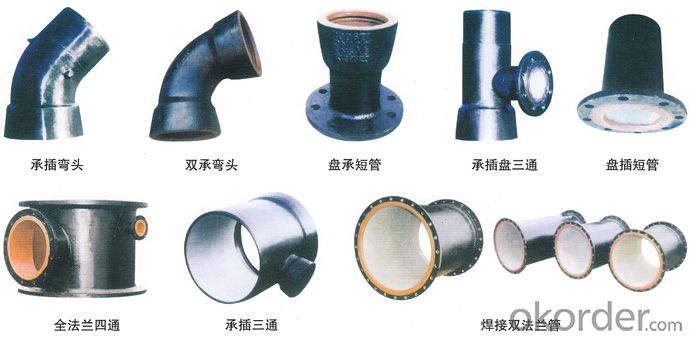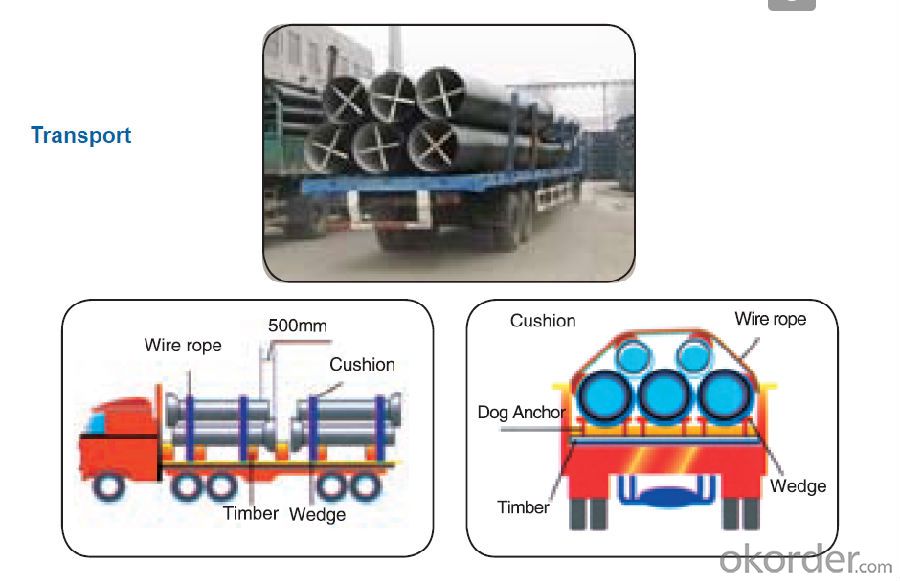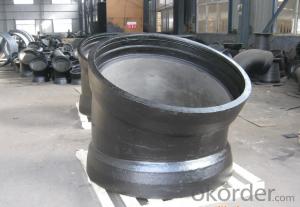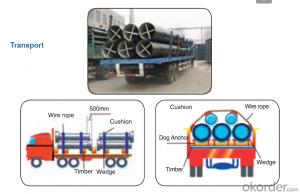Duct Iron Pipe DI Pipe ISO 2531 DN 80-2000mm Mechnical Joint K Type
- Loading Port:
- Tianjin
- Payment Terms:
- TT OR LC
- Min Order Qty:
- 100 m
- Supply Capability:
- 100000 m/month
OKorder Service Pledge
OKorder Financial Service
You Might Also Like
Ductile iron pipe fittings:
1.EN545/ISO2531 standard
2.rich zinc coat
3.epoxy/black bitumen paint
4.SGS approval
Detailed information:
1) standard: ISO25431, EN545, AWWA C153&C110
2) class: K12, K14
3) material: ductile iron
4). paint: epoxy paint or black bitumen paint with thickness above 70 micron.
5). zinc coat: outside sprayed with zinc in accordance with ISO8179, not less than 130g/m2
6). inside lined with cement mortar as per ISO4179.
7). pressure value: PN10,PN16,PN25.
8). Joint type: the normative joint are Push-on (Tyton-type) joint, we could also supply Mechanical (K-type) joint and flange type if requested.
9). rubber gasket: SBR, EPDM, or neoprene.
10). Minimum order: 1x20’GP.

Transport:

- Q:Will nodular cast iron pipes rust?
- Ductile iron pipe corrosion process is good, decided whether it will rust. Whether it will rust or not, the key is whether the anti-corrosion process of the nodular cast iron pipe is in place.
- Q:Can ductile iron pipes be used for underground irrigation systems?
- Yes, ductile iron pipes can be used for underground irrigation systems. Ductile iron is a strong and durable material that is resistant to corrosion and can withstand the pressure and load requirements of irrigation systems. It is commonly used in underground applications due to its longevity and reliability.
- Q:Are ductile iron pipes suitable for use in saltwater environments?
- Yes, ductile iron pipes are suitable for use in saltwater environments. Ductile iron is highly resistant to corrosion and can withstand the corrosive effects of saltwater, making it a reliable choice for piping systems in such environments.
- Q:What is ductile iron?
- Ductile iron, after being treated with either magnesium or cerium, undergoes an improvement in its mechanical properties. This particular type of cast iron earns the name "ductile" due to its higher degree of ductility in comparison to other cast iron varieties. Ductility pertains to a material's capacity to stretch or deform without breaking. This quality renders ductile iron particularly ideal for applications that demand both high strength and resistance to wear and tear, such as pipes, automotive components, and machinery parts. The inclusion of magnesium or cerium during the manufacturing process aids in the formation of graphite within the iron's structure, contributing to its distinctive properties. This graphite formation serves to enhance the iron's flexibility and reduce its brittleness, enabling it to absorb shock and vibrations without fracturing. As a whole, ductile iron presents a fine balance between the strength of cast iron and the flexibility of steel, thereby establishing itself as a versatile material well-suited for diverse industrial applications.
- Q:Can ductile iron pipe be used for oil and gas pipelines?
- Ductile iron pipe is indeed capable of being utilized for oil and gas pipelines. Renowned for its robustness, durability, and ability to resist corrosion, ductile iron pipe is well-suited for various applications, including the transportation of oil and gas. This pipe has been widely employed in the industry for many years and has consistently proven to be a dependable option for pipeline systems. Furthermore, ductile iron pipe is capable of withstanding high pressure and heavy loads, thus meeting the demands of oil and gas pipelines. However, it is crucial to ensure that the specific grade and specifications of the ductile iron pipe align with the requirements of the particular oil and gas project to guarantee optimal performance and longevity.
- Q:Can ductile iron pipe be used for gas distribution systems?
- Yes, ductile iron pipe can be used for gas distribution systems. Ductile iron is a strong and durable material that is resistant to corrosion, making it suitable for underground applications. It has been widely used in gas distribution systems for many years due to its ability to withstand high pressure and provide a reliable and long-lasting solution. Additionally, ductile iron pipes are known for their flexibility, which allows for easier installation and maintenance. However, it is important to ensure that the specific requirements and standards of gas distribution systems are met when using ductile iron pipes to ensure the safety and efficiency of the system.
- Q:What is the disadvantage of nodular cast iron in excess of silicon?
- Therefore, the increase of silicon content in nodular iron greatly improves the strength index and reduces toughness. Ductile iron has a greater crystalline undercooling and a tendency to chill when treated by spheroidizing, and silicon reduces this tendency.
- Q:What are the disadvantages of using ductile iron pipe?
- Using ductile iron pipe comes with several disadvantages. To begin with, one major drawback is its cost. Ductile iron pipe tends to be pricier than alternative piping materials like PVC or traditional cast iron. This can make it less desirable for projects with tight budgets. Furthermore, ductile iron pipe is relatively heavy in comparison to other materials. This makes it more challenging to handle and install, requiring specialized equipment and additional labor. The weight also increases the risk of damage during transport and installation. Another disadvantage is its susceptibility to corrosion. While ductile iron is more resistant to corrosion than traditional cast iron, it is still prone to rust and deterioration over time. This can result in a reduced lifespan and potential leaks or pipe failures. In addition, ductile iron pipe has limited flexibility and is not as resistant to ground movement or settlement. This can lead to cracks or breaks in the pipe, especially in areas with unstable soil conditions or seismic activity. Finally, ductile iron pipe can have a rough interior surface, which can increase friction and decrease flow capacity. This results in higher pumping costs and decreased efficiency in fluid transportation. In conclusion, although ductile iron pipe offers advantages like strength and durability, it is important to carefully consider these drawbacks when selecting the appropriate piping material for a specific project.
- Q:Are ductile iron pipes suitable for irrigation canal systems?
- Yes, ductile iron pipes are suitable for irrigation canal systems. Ductile iron pipes have high strength and durability, making them resistant to external loads and pressure variations common in irrigation systems. They also have excellent corrosion resistance, ensuring a long lifespan and minimizing maintenance needs. Additionally, ductile iron pipes have smooth interiors, reducing friction and allowing for efficient water flow, which is crucial for irrigation canal systems.
- Q:Are ductile iron pipes suitable for use in hydroelectric dams?
- Hydroelectric dams benefit from the suitability of ductile iron pipes. Ductile iron, a more flexible and stronger type of iron compared to traditional cast iron, is an ideal option for various applications, including water transmission systems in hydroelectric dams. Ductile iron pipes possess durability and resistance to corrosion, which is essential in the continuous water exposure environment of a dam. They can endure high pressures and extreme temperatures, making them fitting for the demanding conditions within hydroelectric dams. Moreover, ductile iron pipes exhibit excellent joint integrity, guaranteeing their leak-proof and reliable performance throughout their lifespan. This aspect is crucial for maintaining the efficiency and effectiveness of a hydroelectric dam's water transmission system. Additionally, ductile iron pipes prove to be cost-effective when compared to materials like steel or concrete. With a long service life, minimal maintenance requirements, and easy availability, they present a practical choice for hydroelectric dam projects. In conclusion, ductile iron pipes are a viable option for hydroelectric dams due to their durability, corrosion resistance, high-pressure tolerance, joint integrity, and cost-effectiveness. They provide the necessary strength and flexibility to efficiently transport water within the dam, contributing to the overall success and longevity of the hydroelectric power generation system.
1. Manufacturer Overview |
|
|---|---|
| Location | |
| Year Established | |
| Annual Output Value | |
| Main Markets | |
| Company Certifications | |
2. Manufacturer Certificates |
|
|---|---|
| a) Certification Name | |
| Range | |
| Reference | |
| Validity Period | |
3. Manufacturer Capability |
|
|---|---|
| a)Trade Capacity | |
| Nearest Port | |
| Export Percentage | |
| No.of Employees in Trade Department | |
| Language Spoken: | |
| b)Factory Information | |
| Factory Size: | |
| No. of Production Lines | |
| Contract Manufacturing | |
| Product Price Range | |
Send your message to us
Duct Iron Pipe DI Pipe ISO 2531 DN 80-2000mm Mechnical Joint K Type
- Loading Port:
- Tianjin
- Payment Terms:
- TT OR LC
- Min Order Qty:
- 100 m
- Supply Capability:
- 100000 m/month
OKorder Service Pledge
OKorder Financial Service
Similar products
New products
Hot products
Related keywords



























